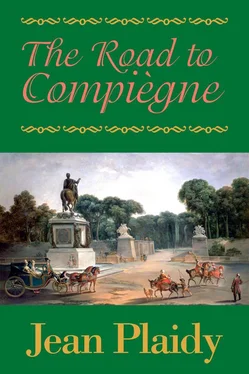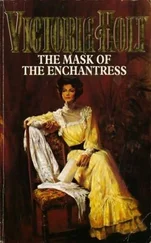Chapter VII
LA PETITE MORPHISE
There were riots all over Paris. On this occasion it was not poverty which had aroused the wrath of the people.
Bouettin, the curé of Saint-Etienne-du-Mont, had been asked to administer the last sacrament to Abbé Le Mère who was a Jansenite priest. Bouettin declared that Le Mère had opposed the Bull Unigenitus and for this reason he refused him the last sacrament.
To deny the last sacrament to a dying man seemed, to those people who did not hold Ultramontane views, an act of callous criminality and, when the Abbé was buried, ten thousand people followed him to his grave.
Protests were made to the Archbishop of Paris, Christophe de Beaumont, whose reply was that those who did not accept the Bull Unigenitus were in his view heretics and therefore not entitled to the sacrament.
The protagonists were clearly determined to make an issue of this case. Even before the Abbé had died the magistrates had called on the King at Versailles and had extracted his promise that the Abbé should receive the sacrament.
Since Bouettin, under the protection of the Archbishop, refused to administer the sacrament, the Parlement decided that their authority would be flouted if they did not protest; but as the Archbishop was too important a man to be attacked, they contented themselves with issuing a warrant for the arrest of Bouettin.
Louis realising that, in issuing such a warrant without his consent, the Parlement was flouting his authority, quashed the warrant.
Thus the Parlement was brought into conflict with the King, and dissension spread from Paris to the provinces.
The President of the Parlement called on the King to warn him and to remind him of what could happen to kings who set themselves against their parliaments.
The name of Charles I of England was not mentioned, but the case of the King who had quarrelled with his Parliament and lost his head as a consequence was in everyone’s mind.
Louis’ answer was that it was the duty of the Parlement to acquaint him with acts of dissension, but for him to judge them.
By this attitude he had won the approval of neither side. The Parlement considered that the King was obstructing it in its duties; the Ultramontane clergy knew that the King was not with them, and that they must rely for their support on the Queen, who was powerless, and the Dauphin, from whom they hoped a great deal.
The Parlement pointed out that since Louis had ascended the throne forty-two thousand lettres de cachet had been received by people who would not agree to the Bull Unigenitus.
Louis grew tired of the wrangle and sought to divert himself by increasing his pleasures. Meanwhile all over the country there were quarrels between those who accepted the Bull and those who did not. It was not safe for priests to walk in the streets, as the very sight of priestly garments was enough to inflame a certain section of the people.
The riots continued. The Dauphin watched the progress of events with eagerness.
The King protested that he was weary of such dissensions.
‘Let me hear no more of this matter of administering the sacraments,’ he pleaded.
* * *
To escape from the controversy all about him the King paid a visit to the artist, François Boucher, whose work he greatly admired and whom he had employed to decorate walls and ceilings of certain of his châteaux .
He insisted that Boucher take him to his atelier that he might see his latest work, and while he was there his eyes fell on a portrait of a child. She was in her very early teens, and Louis paused before the portrait in admiration.
‘That,’ he said, ‘is not a true picture of the model. You have idealised that creature. No one could be so perfectly beautiful.’
The artist was about to protest but he hesitated, and the King saw a wary look come into his eyes.
‘You are right, Sire,’ he said. ‘It is an idealised portrait.’
‘Yet,’ said Louis, ‘so lifelike that, if such a perfect child existed, one could imagine her stepping out of the picture.’
‘Your Majesty is gracious to commend my work. Allow me to present you with this picture.’
The King laid his hand on the artist’s arm. ‘No, my friend,’ he said. ‘I read your thoughts. It would grieve you greatly to part with that picture. It would be like losing a friend.’
‘Your Majesty is mistaken . . .’
The King raised his eyebrows in surprise; it was necessary to accept blunt words from these artists who did not understand that in the etiquette of Versailles it was impossible for a humble workman to tell the King he was wrong.
Boucher stumbled on: ‘Nothing would give me greater pleasure than for Your Majesty to accept the picture.’
The King shook his head. ‘So there was no model,’ he said. ‘That perfect child never existed outside the artist’s imagination. It is a sad thought, Monsieur Boucher.’
‘Very sad, Your Majesty.’
The King was smiling when he left the atelier .
* * *
When Louis returned to Versailles he summoned his valet de chambre Le Bel.
Le Bel had become one of his most valued servants, and this was due to the peculiar duties which he performed with astonishing skill.
Since he had been introduced to a serving-girl in the apartments of Madame de Pompadour, Louis had found such types greatly to his taste. It was stimulating to cast off all need for finesse , to escape from the etiquette of the Court which insinuated itself even into the bedchamber. With young working-girls etiquette was ignored simply because they were unaware of its existences.
Le Bel had made it his cherished duty to find such girls who could administer to the King’s pleasure. He was indefatigable; he would discover them in market or shop, tempt them with such a fortune to be earned in a few days as would not have been theirs after years of hard work and parsimonious living.
In almost every case Le Bel’s propositions were irresistible; and thus a stream of little grisettes found their way up the private staircase to those very secret rooms in the north wing of the Palace, which to the knowledgeable had become known as le trébuchet .
Here in this ‘snare for birds’ Louis received these young girls, who pleased him for as long as they could and then were dismissed with a present which made them a very suitable partie , and so would ensure a life of comparative comfort.
‘Le Bel,’ said Louis, ‘I want you to find for me a certain dark-eyed girl. She cannot be more than fourteen, I’ll swear.’
‘Her name, Sire?’
‘That I cannot tell you, for I do not know it. The only clue I can give you is that there is a painting of her in Boucher’s atelier . I have a suspicion that you may find her there hidden away somewhere. Boucher prefers to show his canvases rather than his little mistress – and it does not surprise me.’
Le Bel was delighted. Such a quest was what he enjoyed.
‘Sire,’ he said, ‘I can assure Your Majesty that it will not be long before Boucher’s goddess steps from her canvas into your arms.’
‘I am glad to hear you say that,’ said Louis. ‘I feel very impatient.’
* * *
The next day found Le Bel drinking in Boucher’s studio.
He greatly admired the painter’s work, he said, and he wondered if he might take a closer look at some of the pictures.
It was easy, with a little flattery, to win the artist’s confidence; and Le Bel was astonished and delighted when a young girl came into the atelier to serve them with wine.
Читать дальше








